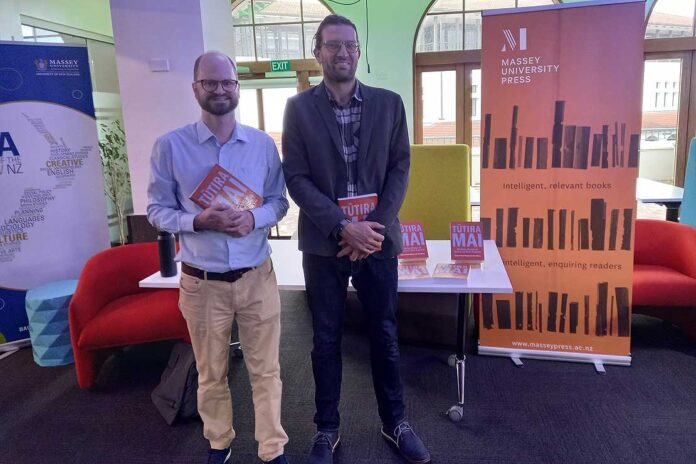Source: Massey University
Dr David Belgrave and Dr Giles Dodson at the book launch in Auckland.
Social change in Aotearoa New Zealand can look like a community protesting the closure of local schools, a rugby club improving its players’ cultural knowledge to improve performance on and off the pitch, an iwi-led community engagement and environmental restoration or a start-up talent agency run by and for people with disabilities.
These are just some of the ways citizens have created social change in Aotearoa, as shown in a new book, Tūtira Mai, edited by Dr David Belgrave a lecturer in Politics and International Relations in the School of People, Environment and Planning and Dr Giles Dodson a senior lecturer in the School of Humanities, Media and Creative Communication and a course coordinator for the course Tū Tira Mai, from which the book gets its name.
They have both worked on the Tū Tira Mai course for several years and this work has led them to develop this book as a companion for the course.
The book was published by Massey University Press and is an exploration of what it means to practice active citizenship and create change in Aotearoa New Zealand and was officially launched on 29 July 2021 at an event on Massey’s Auckland campus.
An integral part of the Massey Bachelor of Arts
The Massey BA program promises students that they will “Think critically. Solve problems. Find work. Change the world.” These are aspirational goals, especially the final one – to change the world. However, the core course Tū Tira Mai and its new companion book offer students a variety to perspectives and examples to help them achieve this goal.
Tū Tira Mai is the final core course required for a BA degree, usually taken in the final year of study. “Our course builds connections between the many disciplines of the BA and the skills of active citizenship so our graduates can apply their knowledge to today’s challenges,” Dr Belgrave says. “It allows students to take constructive action in their communities and the wider world.
Anyone can make change
Dr Dodson says “there are some fields that are more traditionally associated with generating change, such as political science and history, and there are specific disciplines that teach activism and campaigning, but this book demonstrates that one can create change in any field.” The book’s multidisciplinary approach features chapters written by scholars from across the College of Humanities and Social Sciences, introducing various academic perspectives on active citizenship and providing context to social change in Aotearoa New Zealand.
Interspersed between the chapters are case studies which provide real life examples of how New Zealanders have used their skills to create real change in their communities. The chapters and case studies show what it can look like to create change across areas such as theatre, business, and sports management to name just a few. “The book’s multidisciplinary approach gives readers a wide variety of perspectives to draw on and examples to be inspired by,” Dr Belgrave says.
Aotearoa New Zealand focus
In their work with the Tū Tira Mai course, Dr Belgrave and Dr Dodson found that many of the resources available on active citizenship and creating change were created for other countries. So they set out to create a resource for Aotearoa New Zealand which captures local perspectives and issues, from local concerns to national protests, from the history of volunteer work to online activism, and from the complex nature of Māori citizenship to the leadership shown by tāngata whenua in pursuing positive change.
The book also takes a different approach to making change than many other resources. Rather than suggesting a one-size-fits-all approach that prioritises developing communication and strategic planning skills, the book emphasises a holistic approach to change that takes the time to understand the context of the issue. It does not provide an overarching framework, but instead promotes the importance of understanding local conditions, community contexts and historical experiences to making change.
“The main thing I hope readers learn from the book would be the sheer variety in ways people can work towards change. There’s no one set of guidelines or rules, even though there is a lot of generic advice out there for would-be activists,” says Dr Dodson. “Being an active citizen isn’t just one thing; it can be expressed in many ways, all of which contribute to the vibrancy of civil society. The main thing is to participate!”
Tūtira Mai may be purchased from the Massey University Press website.
Related articles
Massey Māori academics featured in new book
More success for Massey University Press and its publisher
Created: 30/07/2021 | Last updated: 30/07/2021



